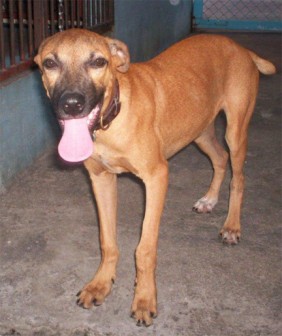Food poisoning
Actually, I should call this ‘garbage poisoning’ because most of these toxicities are associated with the ingestion of garbage and the like.
Indeed, food poisoning seems much more common in recent times. I definitely see more cases with symptoms reminiscent of food poisoning nowadays in the clinic than, say, 20 years ago.
Dogs are notorious scavengers, even those that are supposedly well-fed and coming from good homes. The dogs are sometimes offered food that we consider unfit for human consumption. For example, we might have had a meatloaf for ages in the fridge or freezer, and then we decide to feed ‘Rover’ with it, since it still looks good. Therein could lie a serious problem, especially if the meatloaf had been heated and frozen and reheated several times.
 Also dogs seem to have a penchant for sniffing, even tasting, carrion. Perhaps this has to do with an indelible memory which has survived through the millennia since the days when the now domesticated dog roamed the land as a vicious carnivore. Over the eons, the present-day dog has become ‘soft’ and no longer has the immune system to ward off the toxins inherent in decaying food.
Also dogs seem to have a penchant for sniffing, even tasting, carrion. Perhaps this has to do with an indelible memory which has survived through the millennia since the days when the now domesticated dog roamed the land as a vicious carnivore. Over the eons, the present-day dog has become ‘soft’ and no longer has the immune system to ward off the toxins inherent in decaying food.

I have already written about ‘dung eating’ (coprophagy). In this way, dogs can pick all sorts of noxious materials which can unleash a set of symptoms (even leading to a lethal outcome). I should mention in passing that the eating of the dog’s own (or another animal’s) faeces is often related to a poor diet on which the pet is placed. If specific amino acids or minerals or trace elements are missing from their daily fare, then the pets might seek to cover their nutritional deficiencies by eating another animal’s stool. In fact, since the problem is corrected by a change to a more proper and balanced diet, we can assume that coprophagy is less a perverse habit, and more based on nutritional inadequacies.
Symptoms of
food poisoning
The first signs are:
● Vomiting (often bloody)
● Abdominal pain
● Severe diarrhoea, sometimes bloody (develops within hours)
If the problem is complicated by bacterial infection, shock conditions might develop. These latter, if untreated, will result in death in short order.
Mild cases of food poisoning recover within a day or two. However, you should not take the ‘wait and see’ approach. Once your pet is retching uncontrollably, you should carry it to your vet immediately.
Treatment of
food poisoning
Soon after the vomiting begins, one should introduce orally a coating substance (Milk of Magnesia, Pepto Bismol, etc) in an attempt to prevent further absorption of food by the stomach and intestines. Some conditions, especially botulism, will require antibiotic therapy. Your vet will advise you about this.
Poisonings from
human medication
There is not a month that goes by without a patient being presented which exhibits the ill effects of the introduction of human medicine into the owner’s self-help/self-treat plan for his/her pet. The dog stops eating, so the owner makes him swallow mega-doses of an appetite stimulant made for humans. The pet begins to vomit, and the caregiver introduces antemetic (anti-vomiting) tablets or suspensions. The owner diagnoses worms, and all sorts of mad doses of anethelminthics (dewormers) are administered to the poor, unsuspecting pooch. All of this is very wrong.
Also, I should mention that many ‘people’ pills and tablets for pets are coated with sweet tasting substances. If these medicines are not securely stored, the dog might get at them and gobble up a poisonous amount. Please pay special attention to the safe keeping of antithistamines, sleeping pills, sedatives, diet pills, heart preparations and vitamins.
Happy Mashramani.
Please implement disease preventative measures (vaccinations, routine dewormings, monthly anti-heartworm medication, etc) and adopt-a-pet from the GSPCA’s Animal Clinic and Shelter at Robb Street and Orange Walk, if you have the wherewithal to care well for the animals. Do not stray your unwanted pets, take them to the GSPCA’s Clinic and Shelter instead. If you do not wish your pet to have puppies or kittens, you may exploit the GSPCA’s free spay and neutering programme. If you see anyone being cruel to an animal, or if you need any technical information, please get in touch with the Clinic and Shelter by calling 226-4237.




